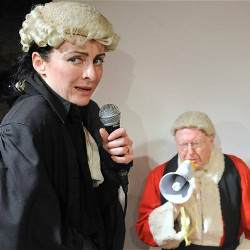A Tale of Two Cities
Adam Spreadbury-Maher’s production of Rattigan’s adaptation of ”A Tale of Two Cities” tries too hard to be contemporary, but starts and ends well and features some excellent performances

© Alastair Muir
This was to have been Terence Rattigan’s second West End play, following his early promise with a slight piece called First Episode, and would have been his only adaptation (in this instance with John Gielgud) of an existing literary work. The original production was abandoned in 1935 and here it is now, a world premiere thirty-six years after Rattigan’s death.
Even though A Tale of Two Cities is one of Dickens’ shorter novels, adapting it into a two and a half hour stage play is inevitably going to mean some drastic cutting, and the chief danger is that the extraordinary momentum of the original story is going to become fractured and distorted, and so it proves. Rattigan and Gielgud were envisaging monumental sets and a large cast of characters. Here, director Adam Spreadbury-Maher has edited the text for eight actors, multiple casting and a simple white slab of a setting.
It starts wonderfully, with a very imaginative staging of the coach being halted on the Dover road, and ends in a similar vein as Jarvis Lorry, Lucie Manette and her father escape from revolutionary Paris, along with the man they still assume to be Sydney Carton. In between, however, Spreadbury-Maher has opted to give the play modern resonance by putting the characters into 21st century street gear and using the songs of Janis Joplin and Amy Winehouse to punctuate the action. Sydney Carton drinks a lot, so we get a sudden burst of Rehab to underline the point.
Similarly, we get a languid Carton from Stewart Agnew with the mannerisms of a preening Russell Brand, and a courtroom scene where the witnesses, the prosecuting counsel, and even the judge, hand each other hard-wired microphones whenever they are called upon to speak. Jennie Gruner is affecting as Lucie Manette, but the scene where she sits in a velvet catsuit, plucking at a toy guitar and singing Sesame Street takes us so far from the world of Dickens that it is bordering on the farcical.
Some of the casting is gender-blind, which is a much more successful ploy. As well as a shrieking harpy of a Madame Defarge, Shelley Lang gives us an odiously swaggering Edward Stryver and a raspingly doddery clerk in Tellson’s Bank. John Hodgkinson, though, is an oddly muscular, strapping Manette, for someone who has spent twenty years languishing in the Bastille.
Head and shoulders above all this is Paul Beech as Jarvis Lorry; he invests every line with decency and humanity, and embodies the one character that both Dickens and Rattigan might have recognised.
This version of A Tale of Two Cities has flair and aplomb aplenty, but the emotional impact is muted. The love story between Darnay (Nicholas Bishop) and Lucy is curiously passionless and, at the end, when Carton is doing “the far, far better thing”, we are almost glad to be rid of a tiresome bore rather than transported by his nobility.
But full marks to Spreadbury-Maher and the King’s Head for retrieving this play from the archive, even if the production is trying too hard to be modish and ‘relevant’. We get the point that there is still revolution in the world. Let the story do its work.












